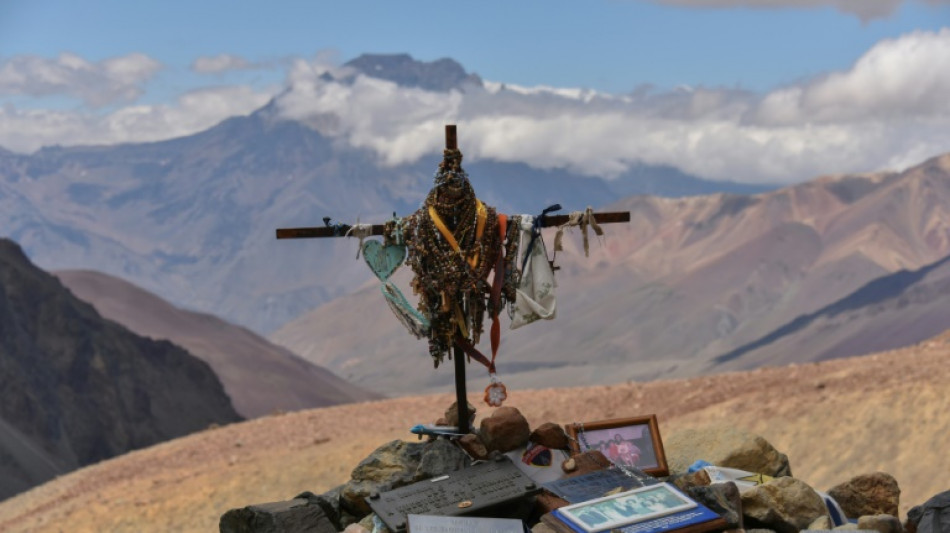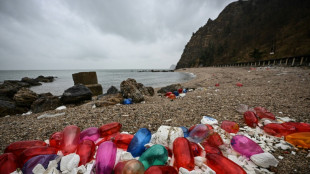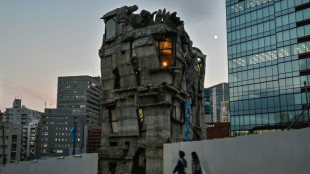
| RBGPF | 100% | 60.1 | $ | |
| SCS | -1.33% | 13.54 | $ | |
| RYCEF | -0.29% | 6.78 | $ | |
| VOD | -0.56% | 8.86 | $ | |
| RIO | -1.53% | 62.03 | $ | |
| BTI | 1.01% | 37.71 | $ | |
| CMSC | -0.65% | 24.57 | $ | |
| NGG | -0.68% | 62.83 | $ | |
| RELX | 0.51% | 46.81 | $ | |
| GSK | -0.38% | 34.02 | $ | |
| AZN | -0.06% | 66.36 | $ | |
| BCE | -1.46% | 26.63 | $ | |
| CMSD | -0.61% | 24.43 | $ | |
| BP | -1.24% | 28.96 | $ | |
| BCC | -2.76% | 148.41 | $ | |
| JRI | -0.98% | 13.24 | $ |

Oscar-tipped 'Society of the Snow' gives voice to Andes plane crash dead
Roberto Canessa has spent most of his life recounting the astonishing tale of how he survived a plane crash, two avalanches and a diet of human flesh before trekking across freezing mountains to save himself and his friends.
Now the infamous tragedy -- or miracle -- in the Andes that hit Canessa, just 19 at the time, and the other members of his Uruguayan rugby team is the subject of a major new Netflix movie, out January 4 and expected to contend for awards including Oscars.
And Canessa, 70, is only too happy to see it told again, convinced that one of the most incredible survival stories of all time still contains important messages for future generations.
"We all have our own personal mountain range," Canessa told AFP.
"And there are many people who are climbing the mountain right now. We must tell them not to be discouraged, to keep going."
"Society of the Snow," from Spanish director J.A. Bayona (also behind "Jurassic World: Fallen Kingdom"), focuses on the odyssey that the young, amateur team went through when their plane to Chile crashed in the frozen, high Andes in 1972.
The film's title and story are taken from a book of the same name by Uruguayan writer Pablo Vierci, who collected the testimonies from various members of the "society."
For Canessa, the name represents the pact that was born when the survivors realized that "civilized society had left us aside."
"When you're in a rugby team on a plane to Chile to play a match, and suddenly you crash... of course, as human beings, you assume that people will come to rescue you," he recalled.
"But the days begin to pass... you have to make your own water, you have to eat the dead because otherwise you will die.
"The dead are there, next to you. You begin to see the death of another person not with sadness for him, but sadness for you, because it is like you are on a waiting list."
- Trapped for 72 days -
On October 13, 1972, a plane with 45 people on board -- members of the Old Christians rugby team, plus some family members and crew -- crashed on the Argentine side of the Andes.
The dramatic impact tore the plane apart, and killed several people including the pilot immediately.
Survivors took shelter in the plane's fuselage, but freezing temperatures -- particularly at night -- thwarted any attempts to trek down the mountain to safety.
Others died during the 72 days they remained trapped in the Valley of Tears, from avalanches, infected wounds and dire conditions.
"What happened to us in the Andes is absurd," said Canessa, ultimately one of just 16 who lived to tell the tale.
Eventually, Canessa and another survivor endured a remarkable 10-day trek over a mountain peak and into Chile to find rescue, using improvised equipment.
The accident and their feat have been addressed previously on the big screen, with the 1993 film "Alive," starring Ethan Hawke.
But Bayona wanted to tell the story in his native language, with local actors, and felt there was still "something that was missing to tell."
"It was giving those who had not returned the chance to express themselves. Finding that twist gave meaning to our film," he said.
- 'Suffering' during filming -
Numa Turcatti, who survived the initial plane crash and helped marshal his increasingly desperate friends throughout their ordeal in the Andes, is the main hero of "Society of the Snow."
For 30-year-old Uruguayan actor Enzo Vogrincic, it was the role of a lifetime, but an intensely difficult challenge.
To portray the impact of the hostile mountain environment, the actors gained and shed considerable weight, and spent hours immersed in the snow.
"There's no way to tell this story unless you go through suffering," he told AFP.
Hungry and constantly cold on set, Vogrincic -- who even shot scenes while feverish -- described filming the scenes of the two avalanches that struck the survivors as "torture."
"It was almost a scientific film, an experiment to make the poor actors go through the same hardships as us... with the advantage that they got to leave at the end of each day," joked Canessa.
"It is a super-light version of what happened on the mountain. We had it much worse. If I had a movie of how we had it, audiences would leave the theater," he added.
- Oscar buzz, and more -
The movie was selected as the closing film at the Venice film festival, and has earned nominations for January's Golden Globes and Critics Choice Awards.
It is also Spain's official entry for the Oscars, and has made the final shortlists of possible nominees for best international film, best visual effects, best score, and best makeup and hairstyling.
Academy Award nominations will be unveiled in January.
Canessa says the rescue trek through the Andes taught him to take life step by step, and he believes the film serves as a useful metaphor for people watching to think about how they can react to their own challenges.
"Sit in the cinema and let yourself be carried away by thinking about what you would do if the plane in your life crashed," he said.
W.Dupont--JdB



